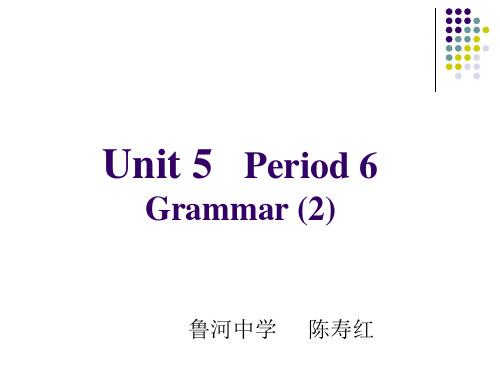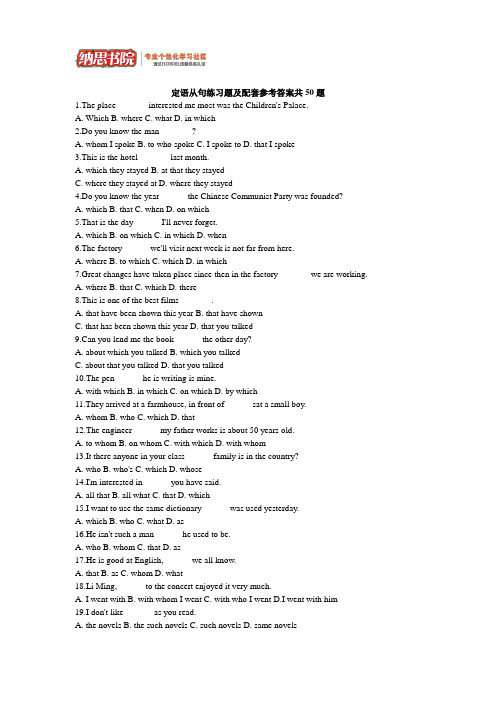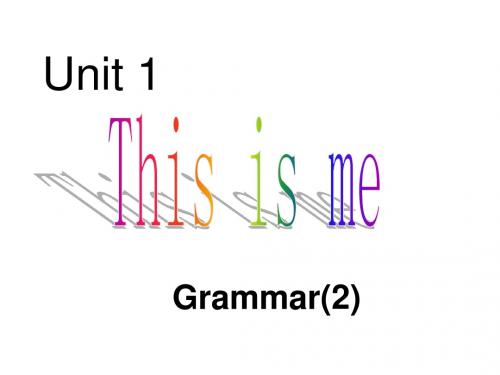Grammar2 (2)
- 格式:ppt
- 大小:1.06 MB
- 文档页数:15



定语从句练习题及配套参考答案共50题1.The place _______interested me most was the Children's Palace.A. WhichB. whereC. whatD. in which2.Do you know the man _______?A. whom I spokeB. to who spokeC. I spoke toD. that I spoke3.This is the hotel _______last month.A. which they stayedB. at that they stayedC. where they stayed atD. where they stayed4.Do you know the year ______the Chinese Communist Party was founded?A. whichB. thatC. whenD. on which5.That is the day ______I'll never forget.A. whichB. on whichC. in whichD. when6.The factory ______we'll visit next week is not far from here.A. whereB. to whichC. whichD. in which7.Great changes have taken place since then in the factory _______we are working.A. whereB. thatC. whichD. there8.This is one of the best films _______.A. that have been shown this yearB. that have shownC. that has been shown this yearD. that you talked9.Can you lend me the book ______the other day?A. about which you talkedB. which you talkedC. about that you talkedD. that you talked10.The pen ______he is writing is mine.A. with whichB. in whichC. on whichD. by which11.They arrived at a farmhouse, in front of ______sat a small boy.A. whomB. whoC. whichD. that12.The engineer ______my father works is about 50 years old.A. to whomB. on whomC. with whichD. with whom13.It there anyone in your class ______family is in the country?A. whoB. who'sC. whichD. whose14.I'm interested in ______you have said.A. all thatB. all whatC. thatD. which15.I want to use the same dictionary ______was used yesterday.A. whichB. whoC. whatD. as16.He isn't such a man ______he used to be.A. whoB. whomC. thatD. as17.He is good at English, ______we all know.A. thatB. asC. whomD. what18.Li Ming, ______to the concert enjoyed it very much.A. I went withB. with whom I wentC. with who I wentD.I went with him19.I don't like ______ as you read.A. the novelsB. the such novelsC. such novelsD. same novels20.He talked a lot about things and persons ________they remembered in the school.A. whichB. thatC. whomD. what21.The letter is from my sister, ______is working in Beijing.A. whichB. thatC. whomD. who22.In our factory there are 2,000 workers, two thirds of ____are women.A. themB. whichC. whomD. who23.Y ou're the only person ______I've ever met ______could do it.A. who;/B./; whomC. whom;/D./; who24.I lost a book, ______I can't remember now.A. whose titleB. its titleC. the title of itD. the title of thatst summer we visited the West Lake, ______Hangzhou is famous in the world.A. for whichB. for thatC. in whichD. what26.I have bought such a watch _______ was advertised on TV.A. thatB. whichC. asD. it27.I can never forget the day _______ we worked together and the day ______ we spent together.A. when; whichB. which; whenC. what; thatD. on which; when28.The way ______he looks at problems is wrong.A. whichB. whoseC. whatD./29.This is the reason ______he didn't come to the meeting.A. in whichB. with whichC. thatD. for which30.This machine, ______for many years, is still working perfectly.A. after which I have lookedB. which I have looked afterC. that I have looked afterD. I have looked after31.The reason ______he didn't come was ______he was ill.A. why; thatB.that;whyC. for that;thatD.for which;what32.He is working hard, ______will make him pass the final exam.A.thatB.whichC.for whichD.who33.That is not the way ______I do it.A./B.whichC.for whichD.with which34.I have two grammars, ______are of great use.A. all of whichB. either of whichC. both of thatD. both of which35.I want to use the same tools _______used in your factory a few days ago.A. as wasB. which wasC. as wereD. which36.My neigh bours used to give me a hand in time of trouble, _______ was very kind of them.A. whoB. whichC. thatD. it37.This is the magazine _______ I copied the paragraph.A. thatB. whichC. from thatD. from which38.He is not such a man _______ would leave his work half done.A. thatB. whichC. whoD. as39. Y ou can depend on whatever promise _______ he makes.A. /B. whyC. whenD. whose40. Smoking, _______ is a bad habit, is, however, popular.A. thatB. whichC. itD. though41. --- Did you ask the guard _______ happened?--- Y es, he told me all _______ he knew.A. what; thatB. what; whatC. which; whichD. that; that42. I shall never forget those years _______ I lived on the farm withthe farmers, _______ has a great effect on my life.A. when; whoB. that; whichC. which; thatD. when; which43. The number of the people who _______ cars _______ increasing.A. owns; areB. owns; isC. own; isD. own; are44. During the days ________, he worked as a servant at the Browns.A. followedB. followingC. to followD. that followed45. Is oxygen the only gas _______ helps fire burn?A. thatB. /C. whichD. it46. The clever boy made a hole in the wall, _______ he could see _____ was going on inside house.A. which; whatB. through which; whatC. through that; whatD. what; that47. Is _______ some German friends visited last week?A. this schoolB. this the schoolC. this school oneD. this school where48. John got beaten in the game, _______ had been expected.A. asB. thatC. whatD. who49. I have bought two ballpens, _______ writes well.A. none of themB. neither of themC. neither of whichD. none of which50. All that can be eaten _______ eaten up.A. are beingB. has beenC. had beenD. have been参考答案及解析1. A. which用作关系代词,在定语从句中作主语。



牛津译林版八年级上册Unit 5《Wild animals》(Grammar 2)教学设计一. 教材分析本课选自牛津译林版八年级上册Unit 5《Wild animals》(Grammar 2),主要讨论了关于野生动物的保护问题。
本课主要让学生掌握一般现在时态的被动语态,并且能够运用本课的生词和句型进行讨论和表达。
通过本课的学习,学生能够提高自己的语言运用能力,增强对野生动物保护的意识。
二. 学情分析学生在之前的学习中已经掌握了一般现在时态,对本课的主题也有一定的了解。
但部分学生在语言运用上还存在一定的困难,特别是在被动语态的运用上。
因此,在教学过程中,需要关注学生的个体差异,因材施教,使每位学生都能在课堂上得到锻炼和提高。
三. 教学目标1.知识目标:–掌握一般现在时态的被动语态结构:am/is/are done;–掌握本课的生词和短语,并能熟练运用。
2.能力目标:–能够运用一般现在时态的被动语态进行讨论和表达;–提高学生的语言运用能力和团队合作能力。
3.情感目标:–增强学生对野生动物保护的意识;–培养学生热爱大自然,保护生态环境的情感。
四. 教学重难点•一般现在时态的被动语态结构;•本课的生词和短语。
•一般现在时态的被动语态在实际情境中的运用;•对本课主题的深入理解和讨论。
五. 教学方法1.情境教学法:通过设置各种情境,让学生在实际语境中运用所学知识;2.任务型教学法:通过完成各种任务,提高学生的语言运用能力;3.合作学习法:鼓励学生分组讨论,培养学生的团队合作精神。
六. 教学准备2.PPT;3.练习题。
七. 教学过程1.导入(5分钟)利用图片或视频引导学生谈论野生动物,激发学生的学习兴趣,导入本课主题。
2.呈现(10分钟)通过PPT展示本课的生词和短语,让学生进行认读和学习。
3.操练(10分钟)让学生进行小组活动,用所学的生词和短语编写对话,并进行表演。
4.巩固(10分钟)设计一些练习题,让学生进行抢答,巩固所学知识。
The Fifth PeriodThe Predicatereaching Aims:1. Revise one of the sentence elements _____the Predicate.2.Do plenty of exercises to consolidate what we have revised.Teaching Important Points:1.How to choose different verb forms when they are used as the Predicate.2.The agreement between Subject and Predicate.3.How to use the modal verbs.Teaching Difficult Points:1.The use of verbs used as the Predicate.2.The Use of modal verbs.Teaching Methods:1.Discussion to get every student to masterwhat they have learnt before.2.Pair work or group work to get every studentto be active in the teaching activities.Teaching Aids:1.the multimedia2.the blackboardTeaching procedures:Step I GreetingsGreet the whole class as usual.StepⅡRevisionT:Today we are going to revise the Predicate,especially different types oftenses and the modal verbs.Now let’sdo the exercises.Look at the screen and discuss these sentences with your partner.Then tell us the functions of all the underlined parts in the sentences.(Show the following on the screen.)Discuss the following sentences:1.He speaks English well.2.Hespeaks too rapidly.3.It is getting warmer.4.That boy’sface turned red.5.Why don’tyou put off the meeting?6. He has worked here for twenty years.7. I shall play football this afternoon.8. You shall have the book as soon as I finish it.9. There must be something wrong with the machine.(After a few minutes)T: Are you ready? (Ss: Yes) Please tell us the function of each of the underlined parts.Ss: They are all Predicates.T: Right, please tell me what can be used as Predicate according to these examples. One student, one sentence.S1: In the first sentence, its predicate is a transitive verb.S2: The predicate of the second sentenceS3: In sentence 3 and 4, they have the same verb-----link verb. Their predicates are a link-verb plus a predicative.S4: The predicate of the fifth sentence if a phrasal verb.S5: The predicate of the sixth and the seventh sentences are the same. Their predicates are an auxiliary verb plus a notional verb.S6: The predicate of the eighth sentence and ninth sentence are a modal verb plus a notional verb.Ste pⅢ PracticeT: Now let’s do some exercises. Fill in the blanks with the proper formsof the verbs in the brackets. You should pay attention to the tenses and the agreement between the Subject and the Predicate. Discuss them with your partners. A few minutes later, I’ll check your answers.(Show the following on the screen)Fill in the blanks with the proper verb forms:1.An iron and steel works, with some small factories,________(be)to be built here.2.Every boy and every girl _______(wish) to attend the eveningparty.3.The crew ___________(be)ferent parts of the ship.4.One and a half apples _______(be) left on the table.5.The German and the English language __________(have)something in mon.6.A variety of questions ___________(be) put to the lecturer.7.Another five weeks ______(be) essary for usto finish the work.8.What they have done _________(be) useful to the people.9.In the room ___________-(be) found a big table and a great many chairs.(A few minutes later.)T:Have you finished?Ss:Yes.T:Please give us your answer to each sentence and tell us your reason briefly if you can.One student, one sentence. Any volunteers?S7:1.The answer to the first sentence should be“is”.The reason is that the Subject is“an…works” and “iron and steel”are used as the Attribute , so we should choose a singular verb.S8:2.Though the two subjects are joined by“and”.they are each preceded by“every”.A singular verb is needed here.So we use“wishes”, am I right?T:Do you agree with him?Ss:Yes.He is right.S9:3.Here we use“Were” as its predicate.Because“crew”is a collective noun and should take a plural verb.S10;4.“One and a half” takes a plural noun but a singular verb, so we use “is”as its predicate.S11:5.I think its predicate should be“have”.When a singular noun is modified by two adjectives so as to meantwo distinct things。